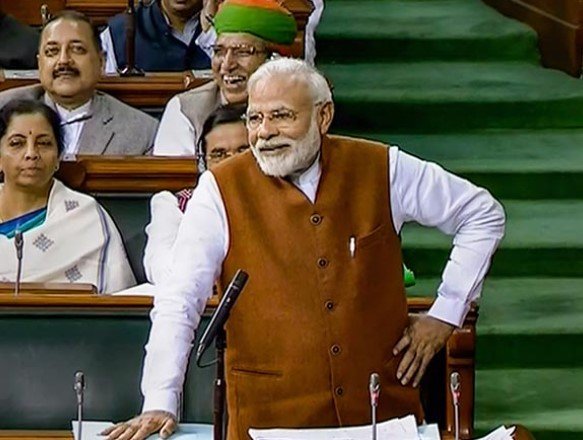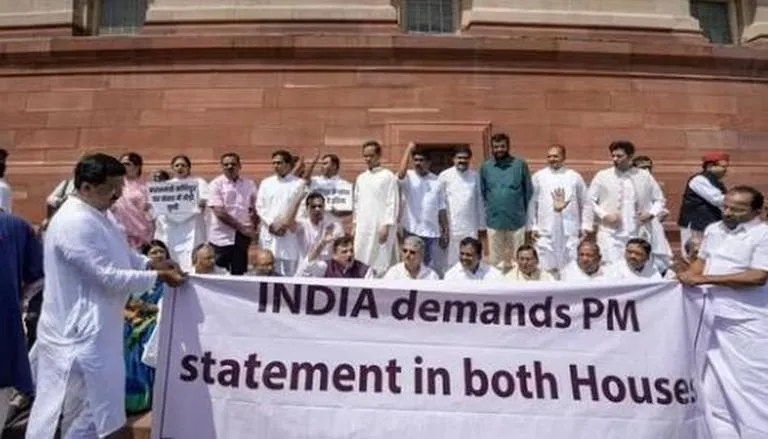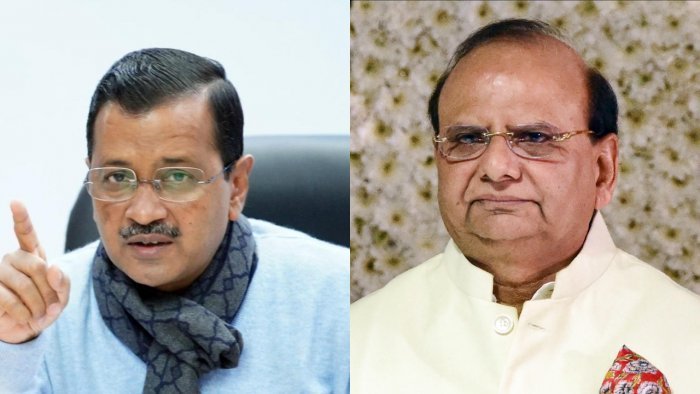NEW DELHI, July 26 (PTI): The no-confidence motion moved against the government on Wednesday will be the 28th ever in Lok Sabha with all previous ones having either been defeated or remained inconclusive, data compiled by a think tank shows.
However, at least thrice governments have fallen during vote on a “motion of confidence”, which is a motion brought by the government to prove its strength.
A no-confidence motion is a formal proposal moved by a member against the government in Lok Sabha under Rule 198 of the Rules of Procedure and Conduct of Business in Lok Sabha.
According to data compiled by PRS Legislative Research, the highest number of no-confidence motions – 15 – in the history of independent India was moved against governments led by Indira Gandhi.
In 1979, a no-confidence motion moved against the Morarji Desai government had led to his resignation, even as the debate remained inconclusive and there was no voting.
Thrice governments have fallen during the vote of confidence – the V P Singh government in 1990, H D Deve Gowda government in 1997 and the Atal Bihari Vajpayee government in 1999.
On November 7, 1990, V P Singh moved a Motion of Confidence in the Council of Ministers. The motion was defeated after the BJP withdrew its support over the Ram temple issue. He lost the motion by 142 votes to 346 votes.
Similarly, in 1997, the H D Deve Gowda government lost a vote of confidence on April 11. Deve Gowda’s 10-month-old coalition government fell as 292 MPs voted against the government, while 158 MPs supported.
After coming to power in 1998, Atal Bihari Vajpayee had moved a confidence motion, which he lost by one vote on April 17, 1999 due to the withdrawal of the All India Anna Dravida Munnetra Kazhagam (AIADMK).
Here is the list of no-confidence motions moved previously:
- August 1963 – The first ever no-confidence motion was moved in the third Lok Sabha in August 1963 against Prime Minister Jawaharlal Nehru by Congress leader Acharya Kripalani. This was immediately after losing to China in the 1962 war. The debate went on for four days, for over 20 hours. Eventually, the motion was defeated, with only 62 MPs supporting it and 347 opposing it.
- September 1964 – A no-confidence motion was moved by N C Chatterjee against the government of Lal Bahadur Shastri. Voting took place on September 18, 1964, and 307 MPs voted against the motion while 50 voted for it. The motion was defeated.
- March 1965 – The motion was moved by Kendrapara MP S N Dwivedy against Lal Bahadur Shastri government. Debate took place on March 16, 1965, and the motion was defeated with only 44 MPs supporting it, while 315 voted against it.
- August 1965 – A no-confidence motion was moved by erstwhile Swatantra Party MP MR Masani. Voting took place on August 26, 1965, and was negated with only 66 MPs supporting it, while 318 MPs opposed the motion.
- August 1966- Indira Gandhi, a Rajya Sabha MP at the time took over as the Prime Minister in January 1966. A no-confidence motion against her government was moved by Communist Party of India MP Hirendranath Mukherjee. The motion was supported by 61 MPs, while 270 MPs opposed it and the motion was defeated.
- November 1966 – Indira Gandhi’s government faced a second no-confidence motion in a year, which was moved by UM Trivedi, noted lawyer and politician of Bharatiya Jan Sangh. The motion was defeated with 36 MPs supporting it, and 235 MPs voting against it.
- March 1976 – In the fourth Lok Sabha, Atal Bihari Vajpayee had moved a no-confidence motion against the Indira Gandhi government. The trust vote took place on March 20, 1967, and 162 MPs voted against the government, while 257 voted in support. This was the highest number of votes polled in support of a no-confidence motion against the government till the time.
- November 1967 – A no-confidence motion was moved by Madhu Limaye against the Indira Gandhi government. Voting took place on November 24, 1967, and was defeated with 88 MPs supporting it, and 215 MPs opposing it.
- February 1968 – A no-confidence motion was moved by Balraj Madhok against the Indira Gandhi government. Voting took place on February 28, 1968, and was defeated with 75 MPs supporting it, and 215 MPs opposing it.
- November 1968 – A no-confidence motion was moved against the Indira Gandhi government by Bharatiya Jana Sangh’s Kanwar Lal Gupta. Voting took place on November 13, 1968, and was defeated with 90 MPs supporting it, and 222 opposing it.
- February 1969 – A motion was moved against the government led by Indira Gandhi by Communist Party of India (Marxist) leader P Ramamurti. The motion was supported by 86 MPs, and opposed by 215 MPs. The motion was defeated.
- July 1970 – A motion was moved against the Indira Gandhi government by Madhu Limaye. The motion got support of 137 MPs, and opposed by 243 MPs. The motion was defeated.
- November 1973 – A motion was moved against the Indira Gandhi government by CPI-M MP Jyotirmoy Basu. The motion was defeated, with 251 MPs opposing it while 54 MPs supported it.
- May 1974 – Jyotirmoy Basu again moved a motion against the Indira Gandhi government. The motion was defeated on May 10, 1974 by voice vote.
- July 1974 – A no-confidence motion was moved by Jyotirmoy Basu against the Indira Gandhi government. Voting took place on July 25, 1974, and was supported by 63 MPs while 297 opposed it. The motion was defeated.
- May 1975 – A little more than a month before the Emergency was enforced on June 25, 1975, a no-confidence motion was moved by Jyotirmoy Basu again. The motion was defeated by voice vote on May 9, 1975.
- May 1978 – A no-confidence motion was moved against the Morarji Desai government by then leader of Opposition in Lok Sabha C M Stephen. On May 11, 1978, the motion was defeated by voice vote.
- July 1979 – A no-confidence motion was moved against Morarji Desai government by YB Chavan. Even though the debate remained inconclusive, Desai resigned from his post and retired from politics. This was the only time a government fell following a no-confidence motion, even as there was no voting on the motion.
- May 1981 – In the seventh Lok Sabha, a no-confidence motion was move against Indira Gandhi government by George Fernandes. Voting took place on May 9, 1981. It was supported by 92 MPs and opposed by 278 MPs. The motion was defeated.
- September 1981 – A motion against the Indira Gandhi government was moved by CPI-M MP Samar Mukherjee. Voting took place on September 17, 1981, and was supported by 86 MPs, while it was opposed by 297 MPs.
- August 1982 – A no-confidence motion was moved against Indira Gandhi government by HN Bahuguna, a former Congress leader who quit the party when Emergency was implemented. Voting took place on August 16, 1982, and was supported by 112 MPs while 333 opposed it. The motion was defeated.
- December 1987 – A no-confidence motion was moved against the Rajiv Gandhi government by C. Madhava Reddy. On December 11, 1982, the motion was defeated by voice vote.
- July 1992 – A no-confidence motion was moved against the P V Narasimha Rao government by BJP’s Jaswant Singh. Voting took place on July 17, 1992. It was a close contest, with 225 MPs supporting it, while 271 MPs opposed it. The motion was defeated.
- December 1992 – A second no-confidence motion in that year was moved by Atal Bihari Vajpayee against the Narasimha Rao. Voting took place on December 21, 1992, after over 21 hours of debate. The motion was defeated with 111 MPs supporting it, and 336 MPs opposing it.
- July 1993 – The third no-confidence motion in the Narasimha Rao government was moved by Ajoy Mukhopadhyay. After over 18 hours of debate, the motion was defeated, with 265 MPs opposing it, while 251 supported it.
- August 2003 – Then Leader of Opposition Sonia Gandhi moved a no-confidence motion against the Atal Bihari Vajpayee government. After an over 21 hours long debate, the motion was defeated on August 19, 2003, with 314 MPs opposing the motion, while 189 supported it.
- July 2018 – The most recent no-confidence motion was moved by Srinivas Kesineni of Telugu Desam Party against the Narendra Modi government. After around 11 hours of debate, the motion was put to vote on July 20, 2018. It was supported by 135 MPs, while 330 opposed it. The motion was defeated.











